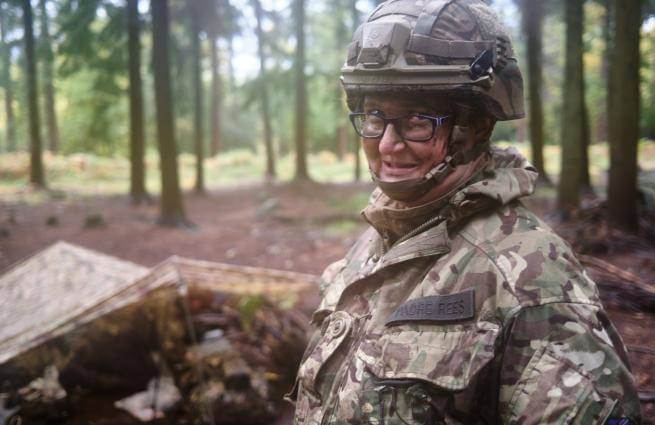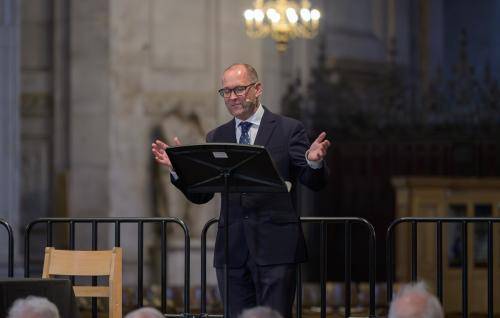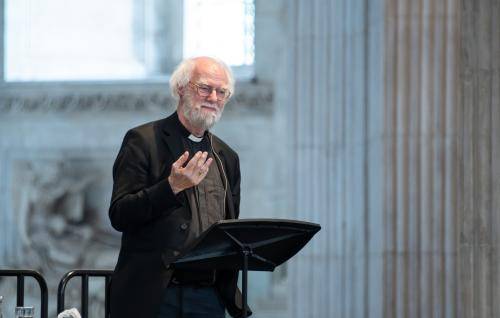Faith on the line
Faith on the line
Reflections on being a Chaplain to the Armed Forces from Revd Adéle Rees CF for the month of May as we remember VE Day 80 years on.
1. 'Who do you say that I am?'
The Army has an interesting relationship with faith. Its Chaplains are held in great love and esteem, our many failings as soldiers overlooked because of our great love for the soldiers we serve with. Yet we are also objects of ridicule, we are holy fools, essential to the moral life of the army, bringing much needed morale to our troops who often express their contempt for the faith that brings us into their lives, even as they express their love for us as individuals.
So who do I say Jesus is to the soldiers I work with?
Most of the individuals I work with would ‘never darken the doors of the church’, yet they will come into my office and lay bare their souls as they seek to make sense of their lives. At higher levels they are the ones who will speak to defend our continued presence in the Army. I wonder sometimes if they ever ponder what it is that draws them in and allows them to open themselves, what it is that makes us such a valuable asset to them. Everything I do as a chaplain, the one to one conversations, the mental fitness and behaviours teaching, the Acts of Remembrance, the Field Services, all of this and more, I do because my answer to the question ‘Who do you say that I am?’ is ‘the God who loves the people I serve’.
We are a nation that has enjoyed peace for the last 80 years, it is a wonderful truth to celebrate. The cost in human life over those years of warfare is incomprehensible, a cost that our sisters and brothers in Ukraine are painfully living with. It is not something any of us should desire, which is why some of you reading this may be pacifists. You may abhor the reality of war, you may actively campaign against the arms trade or nuclear weaponry, and the people I love may present an affront to you.
‘Who do you say that I am?’
When the people I love are stood in front of you they are looking to you, as they look to me, to answer the question ‘who is the God you follow and what does that mean for me?’ I wonder how you will answer Christ in that moment?
2. Wait for the Lord, keep watch, take heart
I’ve discovered many ‘armyisms’ in my 5 years. ‘Hurry up and wait’ is probably one of the most commonly used. There is always an enormous push to be ready as quickly and as soon as possible, usually followed by what seems to be an interminable wait, with people ending up ‘sitting on their bergans’ (an item known in civilian life as a rucksack). My units so far have been at high readiness, with some people living with the need to be ready to deploy on active duty in as little as 24hrs. Bergan packed for all possible situations.
As Christians we are told to be ready for Christ’s return in every moment of life, ‘for you do not know the day or the hour’. That kind of waiting can be both exhausting and profoundly boring. It can leave us with a powerful desire for action, yet forced to contain ourselves. In that kind of waiting space we can begin to think that nothing will ever happen, that we are just being messed about. Perhaps, in our frustration, we find ourselves blaming those around us and above us when our time would be better spent fostering generosity.
Generally I’m a great fan of idleness, I think the constant demands of modern life are quite unhealthy. Idleness can be a space for creativity, think of all those amazing pieces of wartime art made out of tins and bullet casings, I doubt they were knocked out in a few snatched moments. Rather I think they were lovingly carved to pass the hours whilst soldiers thought of home, and family. There is a far greater amount of ‘hanging around’ in warfare than you might imagine.
The sitting and waiting involved in army life always brings to mind the response of a congregant in my curacy parish, when I was (once again!) late to meet her. ‘Oh, no, it’s fine, such a wonderful opportunity for prayer…’
These spaces in between are places of grace for Chaplains, in the waiting space we can open up a conversation about life and faith. We can bring levity, prayer, morale. This last usually being sweet shaped. We wait for the Lord, watching over those entrusted to us, taking heart that there is always enough time for us and for them to be ready. For Christ or for war, whichever comes soonest.
3. Have mercy upon us
We train our people for many trades and activities but underpinning it all is the ability to ‘close with the King’s enemies’. Warfighting is more than just engaging the enemy, it is reconnaissance, and show of force. Any part of this may result in death on either side. Our soldiers need the skills and the training to take life if the situation requires it.
The Bible is very clear that we are not to coldly, in premeditation, without cause or justification, take a life. You shall not murder. Yet there are also examples when the consequence of freedom, or security, or belonging, means that life or lives will be taken. Pity the person whose action to save lives comes at the cost of life.
I will never forget the shouts of my sleeping grandfather as his dreams took him back to the horrors of his time in North Africa in WWII. To be a part of warfighting, to have to take a life to protect others, changes you. We are talking more about ‘Moral Injury’ in military circles. The idea that in seeing, hearing about, being a victim of, or perpetrating, an act that transgresses our sense of what is morally right, causes us measurable harm. A harm that leaves us feeling that we have become ‘bad people’ even if we did not cause the event or our action protected others. To take a life in any other arena would be, quite rightly, a crime. Yet we demand that of our soldiers, if, and only if, the situation requires it.
I frequently listen to soldiers who cannot talk about the awful things they experienced. Soldiers whose friends have taken their own lives because they can no longer live with the wound inflicted on their soul.
I have not been to war, I don’t know what it is really like, pray God I never do. I have colleagues who have said prayers over the bodies of their soldiers to send them home, and then had to enable those who survived an exchange of gunfire or Improvised Explosive Device to go back out into the battlefield.
We live in an imperfect, broken world. A world where some believe they have the right to take whatever they want regardless of the cost. ‘Almighty God, have mercy upon us’ for there are no easy answers. It is a complicated role, to be a Military Chaplain.
4. They shall beat their swords into ploughshares
The reality of military life is that we spend most of our time and energy doing everything we can to avoid having to apply lethal force (another armyism). We are fundamentally, and frustratingly for those who join to fight, peacekeepers.
As Chaplains we do not, and would not want to, bear arms. We share in the work of a military that is committed to ensuring, as far as possible, that warfare is always the path of last resort. Those sharp edged swords make for surprisingly effective ploughshares…
At home that might look like supporting the NHS to deliver COVID vaccinations, or driving trucks during strikes. Overseas that might be ‘show of force’ exercises like the recent Steadfast Dart with our NATO partners, or enduring deployments in Estonia to remind our enemies that we are ready and able. It might also be keeping the peace, as we try to do in places like Mali.
‘Peace’ sounds like it should be simple, after all, it’s just about being nice and getting on with people, right? Yet it is not simple. I can only speak for myself but my life has not been entirely peaceful. I don’t go looking for disagreements, I don’t imagine many of us do, but still I find myself tripping over them. Sometimes it’s a personality clash, or a thoughtless action, other times it is about ideas or behaviours that I just can’t agree with. Fortunately the Bible is full of other people who failed to live in peace to remind me that it is not so straightforward.
I think there are two types of peace that we are to enact. Peacemaking, and Peacekeeping. The first of these creates the environment for peace, what we might consider the ‘soft skills’ of diplomacy: Blessed are the peacemakers, for they will be called ‘Children of God’. This is the work of people of faith, for God desires that we live in peace. The second is about maintaining boundaries: ‘how beautiful on the mountains are the feet of those… who proclaim peace’.
Peacekeeping requires teeth, leverage, power. As unsavoury as that may sound. Without those feet on the mountains, boots on the ground in army speak, who will maintain the boundaries of peace? Peacekeeping is no easy gig either. Precisely because it is not diplomacy, not negotiation, peacekeepers cannot intervene, they can only hold the line and maintain the limits of peace. Sometimes that means our people can only look on when they encounter different social norms, they can hold the line but not cross it. The Moral Injury of warfare is present in peacekeeping also.
There will come a day when the lion will lie down with the lamb, when we will need neither peacemakers or peacekeepers, until then my calling will be to care for those whose service can be as costly in peace as it is at war.
5. For I know the plans I have for you
"For I know the plans I have for you,” declares the Lord, “plans to prosper you and not to harm you, plans to give you hope and a future. (Jeremiah 29.11)
I’ll be off to my next job soon, joining the Princess of Wales’s Royal Regiment in Cyprus for a two-year posting on what we affectionately call a ‘sunshine tour’.
It’s an interesting place historically and we maintain a peacekeeping role on the island. It is also a liminal space for the military. A doorway to help our people return to their ‘normal lives’ after deployment. We take them out of those potentially morally injurious spaces that they have been living in and hold them for a short while in a safe space where they can, hopefully, talk about the things they have seen and experienced. We do this in the hope that they will take less of the hardness of military life back to their friends and families.
The prophet Jeremiah states that God’s plan is always to prosper us, and in the military we do our best to join in with that work. We train our people for an unusual role. We have a responsibility to them and to society to do as much as we can to support their mental fitness. In this respect our soldiers are very fortunate. I honestly believe that the Armed Forces are one of the few remaining spaces in society where people can climb out of desperate circumstances and make a brilliant career for themselves.
For me it is an enormous privilege to have a share in the spiritual, moral and ethical wellbeing of our soldiers and officers. Despite the rather serious tone of the reflections in this series I also get to have an enormous amount of fun. There truly is nothing quite like a Regiment of 300 out of tune voices having a ‘carol off’ before Christmas stand down, or the opportunity to hitch a lift in a Wildcat helicopter to visit the troops. I frequently feel the need to pinch myself to check that I really am this blessed.
I do not know what will happen, or what the future holds. These weeks have been a journey into the depth of affection that I hold for our people, the passion I have for the work I do, and a reminder of God’s grace in calling this most unsoldierly of priests to care for the Army’s people. I hope I shall die an old woman, at peace, in my own bed. If war comes, I know one thing beyond any doubt, I will be sent into battle with my people. Armed with the love that I have for them. Trusting in the full armour of God. I will go because the spiritual and moral wellbeing of the young men and women I serve alongside is worth giving my life for. ‘Where you go, I will go, your people will be my people’ and may my God be yours also.








